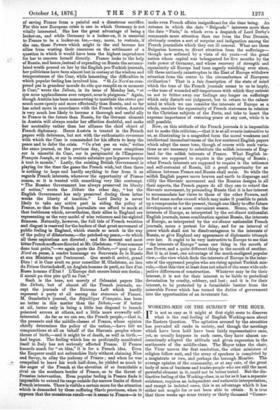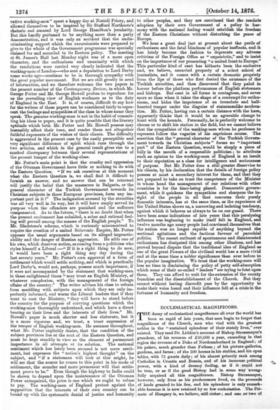WORKING-MEN ON THE SUBJECT OF THE HOUR.
IT is not so easy as it might at first sight seem to discover what is the real feeling of English Working-men about the Eastern Question. The agitation aroused by the atrocities has pervaded all ranks in society, and though the meetings which have been held have been fairly representative ones, yet, as usually happens in such cases, they have almost an- consciously adopted the attitude and given expression to the sentiments of the middle-class. The Mayor takes the chair, the Vicar moves the first resolution, the other ministers of religion follow suit, and the array of speakers is completed by a magistrate or two, and perhaps the borough Member. The average opinion of the community, or at any rate, of the great body of men of business and trades-people who are still the most powerful element in it, could not be better tested. But the dis- tinctive feeling of the Working-class, in so far as it has a separate existence, requires an independent and authentic interpretation, and except in isolated cases, this is an advantage which it has either not sought for or not been able to obtain. It is true that three weeks ago some twenty or thirty thousand "Conser- vative working-men" spent a happy day at Nostell Priory, and allowed themselves to be inspired by Sir Stafford Northe,ote's rhetoric and amused by Lord George Hamilton's jocularity. But this hardly professed to be anything more than a party demonstration, and it was only an accident that the undis- criminating support which the excursionists were prepared to give to the whole of the Government programme was specially claimed for and accorded to its Eastern policy. The meeting at St. James's Hall last Monday night was of a more open character, and the enthusiasm and unanimity with which the resolutions were carried very clearly indicated that the working-men of London—who sent a deputation to Lord Derby some weeks ago—continue to be in thorough sympathy with the great popular movement. But we are still greatly in need of information, and we therefore welcome the two papers in the present number of the Contemporary Review, in which Mr. George Potter and Mr. George Howell profess to reproduce for us the prevailing view of English workmen as to the duty of England in the East. It is, of course, difficult tb say how far the writers of these papers can be considered fairly to repre- sent the feelings and sympathies of the class in whose name they speak. The genuine working-man is not in the habit of commit- ting his ideas to paper, and it is quite possible that the literary aptitude which both Mr. Potter and Mr. Howell possess may insensibly affect their tone, and render them not altogether faithful exponents of the wishes of their clients. The difficulty is aggravated in the present case by the easily perceptible and very significant difference of spirit which runs through the two articles, and which in the general result gives rise to a marked discrepancy between their several representations of the present temper of the working-class.
Mr. Potter's main point is that the cruelty and oppression of the Ottoman Government have little or nothing to do with the Eastern Question. "If we ask ourselves at this moment what the Eastern Question is, we shall find it difficult to furnish an answer, and no answer that can be returned will justify the belief that the massacres in Bulgaria, or the general character of the Turkish Government towards its Christian subjects in these European provinces, form any im- portant part in it ?" The indignation aroused by the atrocities was all very well in its way, but it will have amply served its purpose when the offenders are punished and the sufferers compensated. As to the future, "there is no doubt that when the present excitement has subsided, a sober and rational feel- ing will prevail among the masses of the English people." To Mr. Gladstone's scheme, which is curiously misconceived to require the creation of a united Sclavonic Empire, Mr. Potter opposes the usual arguments based on its alleged impractic- ability and the danger of Russian aggression. He adds one of his own, which deserves notice, as coming from a politician who styles himself a Liberal :••■•••." If it is a right thing to do now, it would have been a right thing any day during the last seventy years." Mr. Potter's own approval of a form of settlement which would settle nothing, and which is practically Lard Derby's, would not, perhaps, possess much importance, if it were not accompanied by the statement that working-men in these enlightened times "may trust an English Ministry, of whatever complexion, with the management of the foreign affairs of the country." The writer advises his class to refrain from meddling with subjects upon which they are only im- perfectly informed, and warns the Liberal leaders that if they want to oust the Ministry, "they will have to stand before the country for the purpose of carrying questions which the working-men thoroughly understand, and which have a direct bearing on their lives and the interests of their lives." Mr. Howell's paper is much shorter and less elaborate, but it is a more vigorous and, we trust, a truer expression of the temper of English working-men. He assumes throughout, what Mr. Potter explicitly denies, that the condition of the subject provinces lies at the root of the Eastern Question, and must be kept steadily in view as the element of paramount importance in all attempts at its solution. The national sentiment which has lately been aroused is not mere senti- ment, but expresses the "nation's highest thought" on the subject, and "if a statesman will look at this aright, he will see that the nearer he comes to this point in his mode of settlement, the sounder and more permanent will that settle- ment prove to be." Even though the highway to India could be shown to depend upon the maintenance of the Ottoman Power unimpaired, the price is one which we ought to refuse to pay. The working-men of England protest against the supposition that the interests of their own country can be bound up with the systematic denial of justice and humanity to other peoples, and they are convinced that the resolute adoption by their own Government of a policy in har- mony with the national feeling would establish the freedom of the Eastern Christians without disturbing the peace of Europe.
We hear a great deal just at present about the perils of enthusiasm and the fatal blindness of popular instincts, and it has lately become the fashion to deprecate any adverse criticism of the Foreign Office as "unpatriotic," and to insist on the importance of our presenting "a united front to Europe." This particular kind of cant has hitherto been the exclusive and, we believe, unenvied property of a select school of journalists, and it comes with a certain dramatic propriety from the lips of those who first denied the existence of the Turkish atrocities, and then discovered that they paled in horror before the platform performances of English statesmen and bishops. But cant in all forms is contagious, and never more so than when it takes the shape of a contempt for enthu- siasm, and hides the impotence of an irresolute and half- hearted temper under the disguise of statesmanlike modera- tion. Mr. Potter, having run a certain distance with the hare, apparently thinks that it would be an agreeable change to hunt with the hounds. Personally, he is perfectly welcome to choose or to shift his station in the field, but we cannot believe that the sympathies of the working-men whom he professes to represent follow the vagaries of his capricious course. The assertion that the "general character of the Turkish Govern- ment towards its Christian subjects" forms no "important part" of the Eastern Question, would be simply a piece of folly in the mouth of a responsible politician ; to attribute such an opinion to the working-men of England is an insult to their reputation as a class for intelligence and seriousness of purpose. But Mr. Potter does a still greater disservice to his clients, by his declaration that the details of foreign policy possess at most a secondary interest for them, and that they are prepared to take on trust the competence of the Minister in whose hand the management of our relations with other countries is for the time-being placed. Democratic govern- ment, while it quickens the sympathies and sharpens the in- sight of the people in all that concerns their purely domestic interests, has at the same time, as the experience of the 'United States shows us, a narrowing and isolating tendency, against which it behoves us always to be on our guard. There have been some indications of late years that this paralysing influence was beginning to make itself felt in England, aad twelve months ago many people had convinced themselves that the nation was no longer capable of anything beyond the sectional agitations and the factious fervour of parochial politics. The recent outburst of spontaneous and disinterested enthusiasm has dissipated this among other illusions, and has proved beyond dispute that the traditional idea of England as one of the great Powers of the civilised world has a more vivid and at the same time a nobler significance than ever before to the popular imagination. We trust that the working-men will lose no time in disclaiming the policy of petty self-absorption which some of their so-called "leaders "are trying to foist upon them. They can afford to wait for the extension of the county franchise and the disestablishment of the Church. But they cannot without lasting discredit pass by the opportunity to make their voice heard and their influence felt at a crisis in the fortunes of humanity and freedom.



































 Previous page
Previous page